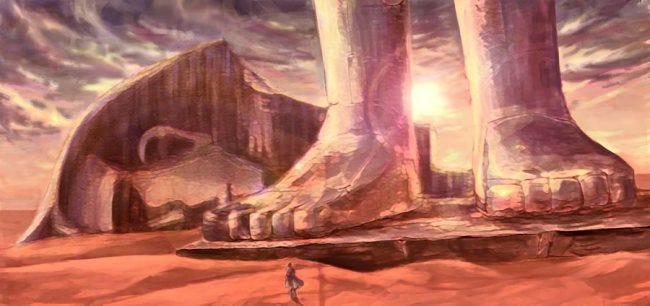I Met A Traveller From An Antique Land

About an hour ago, while I was playing my lunch gig, a friend of mine emailed me: " I never knew two poets wrote identical poems in a friendly competition." The poems, and the competition to which he refers, were inspired by a passage in a Greek history book. The better-known of the two is Percy Bysshe Shelley's "Ozymandias", but the competing poem, written by Horace Smith and given the same name, is also not without merit.
With a lazy afternoon ahead of me, I thought I'd give the competition a long-past-due third entry.
So here's Shelley:
I met a traveller from an antique land Who said: "Two vast and trunkless legs of stone Stand in the desert. Near them, on the sand, Half sunk, a shattered visage lies, whose frown, And wrinkled lip, and sneer of cold command, Tell that its sculptor well those passions read Which yet survive, stamped on these lifeless things, The hand that mocked them and the heart that fed: And on the pedestal these words appear: 'My name is Ozymandias, king of kings: Look on my works, ye Mighty, and despair!' Nothing beside remains. Round the decay Of that colossal wreck, boundless and bare The lone and level sands stretch far away."
Here's Smith:
In Egypt's sandy silence, all alone, Stands a gigantic Leg, which far off throws The only shadow that the Desert knows:— "I am great OZYMANDIAS," saith the stone, "The King of Kings; this mighty City shows "The wonders of my hand."— The City's gone,— Nought but the Leg remaining to disclose The site of this forgotten Babylon.
We wonder,—and some Hunter may express Wonder like ours, when thro' the wilderness Where London stood, holding the Wolf in chace, He meets some fragment huge, and stops to guess What powerful but unrecorded race Once dwelt in that annihilated place.
I have to admit that I really dig Smith's suggestion that modern society is no more permanent that the reign of Ramsesses II, known to the Greeks as "Ozymandias". So my take is more Smith and less Shelley:
Twinned and twain under the pitiless sun Of Egypt's desert stand two legs of stone And their evening shadows merge into one. Before them, a tablet states "It is known That OZYMANDIAS, King of Kings, hath Built this city that stands before your eyes. The mighty knelt and trembled 'fore his wrath. Exceed him, then you may know where he lies." But for this tableau, there is naught but sand Stretching to the horizon all around. No sign of disturbance from foot or hand The sirocco's cry is the only sound.
Will our wonder be shared by the one who Follows a deserted shoreline until He sees the bay flow to the ocean blue --- Across it, two encrusted sentinels Collapsed and bereft of the bridge between Them, rested and rusting the years away? What were they? What could they possibly mean? Did men raise them, or was it gods at play? Be not deceived: that forlorn pharaoh's fate Awaits, too, New York and the Golden Gate.
Any other takers?

